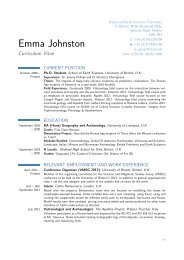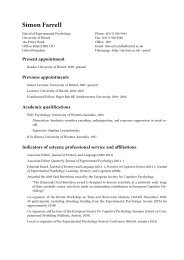What is Scientific Progress?
What is Scientific Progress?
What is Scientific Progress?
You also want an ePaper? Increase the reach of your titles
YUMPU automatically turns print PDFs into web optimized ePapers that Google loves.
For some such sequence of approximation operators, will be a sequence of true propositions whose later<br />
members do add to the truths entailed by the earlier members. Since researchers can see that the<br />
later values are within the bounds of earlier ones, they can have reason to believe that the later<br />
approximations are better than the earlier ones (in addition to whatever reason they may have for<br />
thinking that their techniques are more accurate). Hence they are likely to have beliefs where the<br />
later ones involve attributions of better approximation (even if the belief <strong>is</strong> merely of the form<br />
‘(c=Val(c+ε2)) <strong>is</strong> a better approximation than (c=Val(c+ε0))’). Given the assumption of appropriate<br />
confirmation, the relevant sequence of beliefs will also represent the accumulation of knowledge.<br />
Although though there <strong>is</strong> still a margin for error, we know the value of the velocity of light with<br />
greater accuracy than previously.<br />
To be clear, I have not argued that where there <strong>is</strong> increasing ver<strong>is</strong>imilitude there <strong>is</strong> also the<br />
accumulation of knowledge. Obviously there might not be, as would be the case if the increasing<br />
ver<strong>is</strong>imilitude were accidental. <strong>What</strong> I have argued in th<strong>is</strong> section <strong>is</strong> defensive—it argued against<br />
the claim in (O) that we need the ver<strong>is</strong>imilitude account rather than the cumulative truth or<br />
cumulative knowledge accounts, because only the ver<strong>is</strong>imilitude account can cope with progress in<br />
a sequence of theories none of which <strong>is</strong> fully true (such as Ptolemy-Copernicus-Kepler). That claim<br />
<strong>is</strong> m<strong>is</strong>taken; we saw that where there <strong>is</strong> increasing ver<strong>is</strong>imilitude there <strong>is</strong> also the accumulation of<br />
truth and so at least the possibility of the accumulation of knowledge.<br />
23






